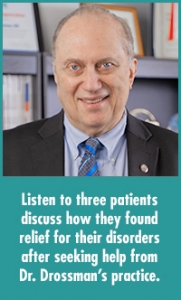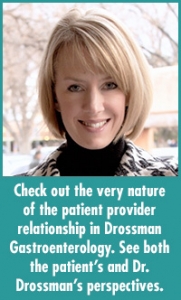Welcome To
Drossman Gastroenterology
Douglas A Drossman, MD, former co-Director of the UNC Center for Functional GI and Motility Disorders is seeing patients at Drossman
Gastroenterology PLLC located at Sutton Station, 5826 Fayetteville Road, Suite 201, Durham, NC 27713.
Drossman Gastroenterology PLLC will maintain the same biopsychosocial patient centered care model that Dr. Drossman used while at UNC. The practice is located within a multidisciplinary health care center that can provide other health care services. He is joined by Physician Assistant, Elizabeth Thompson Smith PA-C. The clinic is held on Tuesdays and Wednesdays. Most all laboratory and other diagnostic studies are available through the new health care facility.
Payment to Drossman Gastroenterology is by cash, check or credit card at the time of the visit. Proper forms are provided if you choose to file for reimbursement. Unfortunately we are not able to accept Medicare. The physician fee is competitive with the combined physician and hospital fee charges now occurring at UNC Health Care.
Appointments for new patients
If you are coming to see Dr. Drossman for the first time, a referral from your primary care physician or gastroenterologist may be needed. You or your doctor should contact our office and we will work with you to set up the appointment and provide information on local resources if you are coming from out of state.
- Drossman Gastroenterology Accepting Visiting Scholars January 2, 2020
- Dr. Drossman Shifts Roles January 5, 2020
- When Patients Speak, Doctor Drossman Listens January 6, 2020
Our Philosophy
Drossman Gastroenterology is helping patients with difficult to diagnose and treat functional gastrointestinal and motility disorders. We also seek to enhance the physician/patient relationship and improve clinical outcomes by maintaining fundamental values of listening actively, providing patient centered care, and collaborating in treatment.
Samita Garg, MD – Staff, Division of Gastroenterology
Digestive Disease & Surgery Institute Cleveland Clinic Foundation
Samita Garg, MD – Staff, Division of Gastroenterology
Digestive Disease & Surgery Institute Cleveland Clinic Foundation
Beth C-W., Patient
Beth C-W., Patient
Dr. Harley Sobin, Gastroenterologist, retired
Dr. Harley Sobin, Gastroenterologist, retired
M. Andrew Greganti, MD, Vice Chair, Medicine
UNC School of Medicine
M. Andrew Greganti, MD, Vice Chair, Medicine
UNC School of Medicine
Don Powell, MD, Former Chief of GI at UNC
UNC
Don Powell, MD, Former Chief of GI at UNC
UNC
Roy Dekel, MD, Assistant Professor of Medicine
Ichilov Medical Center, Tel Aviv, Israel
Roy Dekel, MD, Assistant Professor of Medicine
Ichilov Medical Center, Tel Aviv, Israel
Lin Chang, MD
Center for Neurovisceral Sciences and Women’s Health
Lin Chang, MD
Center for Neurovisceral Sciences and Women’s Health
I wish more doctors understood the significance of Gut-Brain interaction, especially those in the field of gastroenterology. How can you study the digestive system and not take into account the two major organs that are hard wired with bi-directional communication? The absence of this knowledge coupled with a dualistic model failed me as a patient and robbed me of ten very precious years of my life.
In 2009, my normal, healthy and happy life took a drastic turn into a decade of endless testing, endless pain, and endless expenses with no answers and no hope. My GI symptoms were initially mild and probiotics seemed to do the trick. But add on sinus infections, bronchitis, repeated antibiotics, and unmanaged stress - my symptoms became severe. I desperately wanted wellness – for myself and my family. Local doctors could not explain my symptoms, and dozens of tests showed that everything was “normal.” I repeatedly echoed the sentiments of Johanna Ruddy: “I AM IN PAIN. WHAT’S WRONG WITH ME? WHY CAN’T SOMEONE HELP ME.” While I was never suicidal, I continually prayed, “Lord heal me, take me or sustain me.” I remember telling my husband, “I can’t continue to live with this level of pain.” I was discouraged, hopeless and miserable!
Repeated trips to three nationally recognized medical centers cost me thousands of dollars. Typical GI tests were performed and dietary restrictions were recommended. A team of doctors at Mayo Clinic “found nothing wrong.” Weight loss of thirty pounds could not be explained. One doctor told me to ignore my symptoms – like a pilot putting duct tape over the cock-pit controls. They diagnosed me with “unintentional anorexia” and “health anxiety.” I was humiliated and lost all respect for the medical community. If only they assigned the correct diagnosis and understood dysregulation of the brain-gut pathway.
For the next eight years, I floundered. My pain was 24/7 - 365 - level 10! Looking back, I don’t know how I survived. I faked my way through raising three children and being a loving wife. I resorted to mental distraction at work as a coping mechanism because I had no other choice. But then in 2017, God answered my prayers of desperation and led me to a doctor in Charleston, SC who had studied under Dr. Drossman as a GI Fellow, at UNC-Chapel Hill. In a single visit, after a short series of questions, this doctor accurately identified my illness, and referred me to Drossman Care.
I, and my family, are forever indebted and grateful to Dr. Drossman and the Rome Foundation for the magnitude of research done in the field of DGBI’s. Through the care and guidance of Dr. Drossman, I am thrilled to say, I HAVE MY LIFE BACK and I AM PAIN FREE. Healing doesn’t happen overnight and for me, it was a process. It was important for me to acknowledge that years of misdiagnosis would take time to unravel – and the severity of my symptoms would require multiple layers of treatment. My first visit with Dr. Drossman set the stage for success. His methods of communication set me at ease and conveyed a sense of care and concern. He educated me with diagrams and even gave me several journal articles which I happily read. I trusted Dr. Drossman -- perhaps the most critical step -- because without trust, there is no viable treatment plan. Time invested in the Patient Doctor Relationship yielded a huge ROI! And Dr. Drossman’s poop emoji pillow made me smile and definitely helped me let my guard down.
When I arrived at Drossman Care in 2017, I was stuck in a vicious cycle with no way out. An accurate diagnosis coupled with Rome Foundation Research paved the way for healing. My treatment included Pharmacology + CBT + Doctor’s Care + Time. Neuromodulators were necessary to regulate signals to the brain. Equally, if not more important, CBT helped me identify and change behaviors that were hurtful and an impedance to healing. Calm the brain, calm the gut! I wasn’t crazy, but my A-type, overachieving personality needed a total OVERHAUL. Today, my life is vastly improved, better balanced and even restful. I am thankful that the biopsychosocial model not only saved my life but gave me a much better quality of life to enjoy!
Karen Salem
Patient
Karen Salem
Patient
 5826 Fayetteville Rd., Suite 201 Durham, NC 27713
5826 Fayetteville Rd., Suite 201 Durham, NC 27713  (919) 246-5611
(919) 246-5611 

